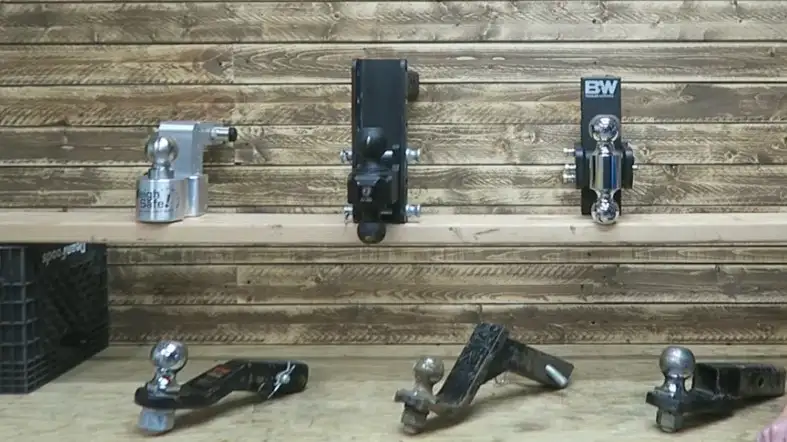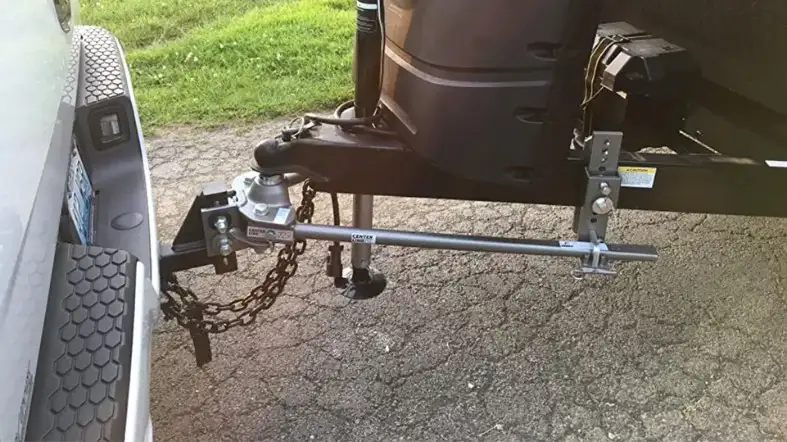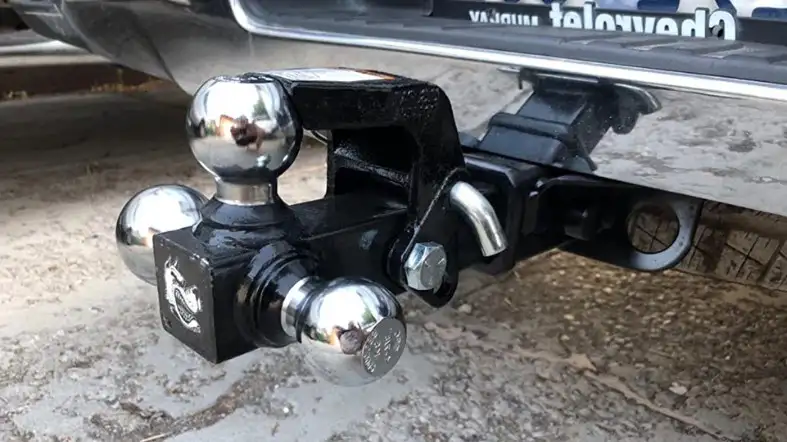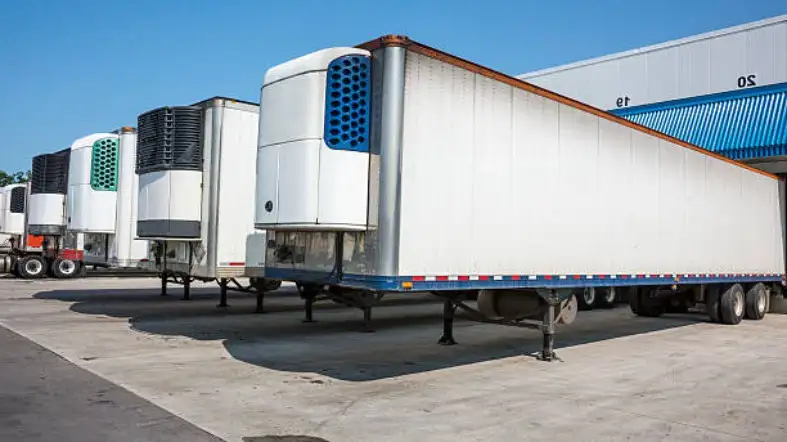Whether you are towing a trailer, hauling heavy cargo, or simply using your truck for transportation, a hitch can be an essential accessory to keep your truck performing at its best.
There are many different types of hitches available, each designed to suit different applications and carrying capacities.
Choosing the right hitch for your truck requires careful consideration of a variety of factors, including the weight of your load and the type of driving you to do.
In this article, we will discuss different types of hitches for trucks.
Types Of Hitches For Trucks

1. Bumper hitch
A bumper hitch is the most basic type of hitch and is typically used for smaller trailers, such as pop-up campers or utility trailers.
Bumper hitches mount to the rear bumper of the vehicle and typically have a weight capacity of 2,000 to 3,500 pounds.
Pros:
1. One of the primary benefits of a bumper hitch is that it increases the towing capacity of a vehicle.
This makes it possible to tow heavier trailers without damaging the vehicle.
2. Another benefit of a bumper hitch is that it is easy to hook up.
It does not require any special tools or knowledge to hook up, making it a great option for those who are new to towing.
Cons:
1. One of the primary disadvantages of a bumper hitch is that it can damage the bumper of your vehicle.
2. Another disadvantage of a bumper hitch is that it can limit your visibility when you are backing up.
2. Weight-Distributing Hitch

A weight-distributing hitch is a more sophisticated type of hitch that is used for larger trailers, such as travel trailers or fifth wheels.
Weight-distributing hitches distribute the trailer’s weight evenly across the vehicle’s axle, which helps to improve handling and braking.
Weight-distributing hitches typically have a weight capacity of 4,000 to 7,500 pounds.
Pros:
1. One of the benefits of using a WDH is that it can help to prevent trailer sway.
Trailer sway can be dangerous, as it can cause the tow vehicle and trailer to lose control.
2. Another benefit of using a WDH is that it can help to improve fuel economy.
This is because distributing the weight of the trailer evenly helps to reduce drag on the tow vehicle.
Cons:
1. Some of the potential drawbacks of using a WDH include the fact that they can be difficult to set up, and they may not work well with all types of trailers.
2. Some people find that WDHs make their tow vehicle feel less stable on the road
3. Gooseneck hitch

A gooseneck hitch is a specialized type of hitch that is used for very large trailers, such as livestock trailers or car carriers.
Gooseneck hitches mount to the bed of the truck and provides superior stability and control when hauling heavy loads.
Gooseneck hitches typically have a weight capacity of 10,000 pounds or more.
Pros:
1. One of the biggest advantages of a gooseneck hitch is its increased towing capacity.
Gooseneck hitches can typically tow up to 30,000 pounds, which is significantly more than most traditional trailer hitches.
2. Another advantage of gooseneck hitches is their improved maneuverability.
Because the trailer is attached closer to the center of the vehicle, it can make turns more easily and with less effort.
Cons:
1. Gooseneck hitches can also be more difficult to install and remove, and they may not be compatible with all vehicles.
4. Fifth wheel hitch
A fifth wheel hitch is a specialized type of hitch that is used for large trailers, such as travel trailers or fifth wheels.
Fifth wheel hitches mount to the bed of the truck and provide superior stability and control when hauling heavy loads with a weight capacity of 8,000 to 15,000 pounds.
Pros:
1. Fifth wheel hitches provide a more stable connection between the trailer and the tow vehicle, which can be beneficial when hauling heavy loads.
2. Additionally, fifth wheel hitches allow for a tighter turning radius, which can be helpful when maneuvering in tight spaces.
Cons:
1. One of the biggest disadvantages is that fifth wheel hitches can be more difficult to install than other types of hitches.
2. Fifth wheel hitches can be more expensive than other types of hitches.
3. Fifth wheel hitches typically require the use of a specialized trailer that is designed to work with this type of hitch.
5. Pintle hitch

A pintle hitch is a specialized type of hitch that is used for very large trailers, such as livestock trailers or car carriers.
Pintle hitches mount to the bed of the truck and provide superior stability and control when hauling heavy loads.
Pintle hitches typically have a weight capacity of 10,000 pounds or more.
Pros:
1. One of the main advantages of a pintle hitch is its versatility.
2. It can be used for both light-duty and heavy-duty towing applications.
3. It can be easily attached and detached from the tow vehicle.
This makes it a great option for those who need to frequently hook up and unhook their trailer or RV.
Cons:
1. It can be difficult to line up the hitch with the receiver on the tow vehicle.
This can make it challenging to hook up the trailer or RV, especially if you’re in a hurry.
2. A pintle hitch can add additional weight to the tow vehicle, which may negatively impact its performance.
How To Choose The Right Hitches For Truck
1. Towing capacity
The first thing you need to know when choosing a hitch for your truck is the towing capacity of your truck.
The towing capacity is the maximum weight that your truck can safely tow.
You can usually find the towing capacity in the owner’s manual or on a sticker inside the driver’s door.
2. Type of trailer

The next thing you need to consider is what type of trailer you will be pulling with your hitch.
There are three main types of trailers: travel trailers, fifth-wheel trailers, and toy haulers.
Travel trailers are the most common type of trailer and can be pulled by most trucks.
Fifth-wheel trailers are larger and heavier than travel trailers and require a special hitch that mounts in the bed of the truck.
Toy haulers are specialized trailers that are designed for hauling recreational vehicles, such as ATVs or motorcycles.
3. Tongue weight
The tongue weight is the weight of the trailer that rests on the hitch.
It is important to choose a hitch that has a high enough weight capacity to accommodate the tongue weight of your trailer.
You can usually find the tongue weight listed in the owner’s manual or on a sticker on the trailer itself.
4. Gross Vehicle Weight Rating (GVWR)
The Gross Vehicle Weight Rating (GVWR) is the maximum weight that a vehicle can be without being overloaded.
This includes the weight of the vehicle, any passengers, any cargo, and any tongue weight from a trailer.
You will need to choose a hitch that has a GVWR that is equal to or greater than the GVWR of your trailer.
5. Size of the ball mount
The ball mount is what attaches the hitch to your truck. The size of the ball mount you need will depend on the size of your trailer’s coupler.
The coupler is the part of the trailer that attaches to the ball mount.
You will need to know both the size of your trailer’s coupler and the size of your truck’s receiver before you can choose a ball mount
FAQs on Types Of Hitches For Trucks
What Are The Three Main Types Of Hitches For Trucks?
Gooseneck hitches
Gooseneck hitches provide a more stable connection between the trailer and the truck, which helps to reduce sway and improve safety.
Fifth wheel hitches
Fifth wheel hitches provide a more stable connection between the trailer and the truck, which helps to reduce sway and improve safety.
Bumper pull hitches
Bumper pull hitches are less expensive than other types of hitches, but they can be more difficult to maneuver and are not as safe as other types of hitches.
How Do I Know Which Hitch Is Right For My Truck?
The first step is to determine the weight capacity of your truck.
This information can be found in your owner’s manual or on the manufacturer’s website.
Once you know the weight capacity, you can narrow down your options by choosing a hitch with a similar capacity.
What Are Some Of The Safety Concerns I Need To Be Aware Of When Using A Hitch?
First, make sure that your hitch is properly secured to your vehicle.
Second, check the weight limit of your hitch and make sure not to exceed it.
Third, be aware of your surroundings and what’s behind you when reversing.
And finally, always come to a complete stop before disconnecting your hitch.
Conclusion
Now that you know all about the different types of hitches for trucks, it’s time to decide which one is best for your needs.
The type of hitch you choose will depend on the size and weight of your load, as well as your vehicle’s towing capacity.
With the right hitch in place, you can rest assured that your cargo will make it safely to its destination.
